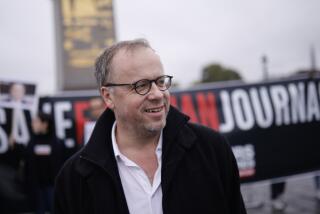Writer Lester Cole Dies; Blacklisted Guild Founder
- Share via
Lester Cole, an unreconstructed socialist who watched a successful screen-writing career vanish in a political cloud when he became one of the “Hollywood Ten” in the postwar Red-scare era, died Thursday of a heart attack.
Cole was 81 and the third member of the once despised but now revered group of writers and directors to die this year.
With his death from a heart attack at the University of California Medical Center in San Francisco, the group is reduced to only two--Ring Lardner Jr. and Edward Dmytryk.
Writers Albert Maltz and Alvah Bessie died in April and July, respectively.
Cole, a founder of the Screen Writers Guild and author or co-author of more than 40 screenplays, was a lifelong socialist who first joined the Communist Party in 1934.
Before his refusal to testify about his politics before the House Un-American Activities Committee in 1947, he had written a series of commercially successful, if not critically acclaimed, films, including “Under Pressure,” “The Romance of Rosy Ridge,” “Objective Burma” and “The House of the Seven Gables.”
But his refusal to cooperate with the House committee and his subsequent imprisonment and fine destroyed him professionally and financially. As recently as 1965 he was forced to use the pseudonym “Gerald L. C. Copley” when he adapted Joy Adamson’s book “Born Free” for film.
A son of Polish immigrants, Cole was born Lester Cohn. He was apart from American mainstream politics as early as the eighth grade, when his school principal chastised him as a “traitor” before his fellow students for opposing American involvement in World War I. He left school at 16, eventually becoming first a stage director and then a playwright, moving to Hollywood to work with 17 other writers on one of film’s first all-star extravaganzas, “If I Had a Million,” in 1932.
He had received a five-year, $250-a-week contract from Paramount as the result of two successful plays that were produced in New York.
Friend Finds Fame
In his 1982 autobiography, “Hollywood Red,” Cole recalled that a New York friend of his who was then seeking a motion picture career, Archibald Leach, had invited him to share his new Westwood home.
Cole also remembered that Leach had a new name--Cary Grant.
Cole, whose politics were influenced by his Marxist father, a garment union organizer, had fallen in love with the theater as a young boy and overcame his parents’ objections to pursue what they viewed as a futile and unpredictable dramatic career.
He had worked with director Max Reinhardt and such well-known actors as Lady Diana Manners and Iris Tree in New York, but he said his political beliefs made him feel apart from their glamorous world.
The financial lure of Hollywood, however, was too strong to ignore.
Became a Writer
By 1938 he had become a writer with nearly two dozen credits and one of the leading advocates of a guild for screen writers, set apart from the studio hierarchy.
It also was, he wrote, his first experience with a “blacklist,” for some of the moguls of that day were threatening pro-guild writers with suspension if they pursued their goal.
Cole, who had not gone completely public with his communist leanings, became more open after the Nazi invasion of the Soviet Union in World War II. And it was that stance that led to his being brought before the committee in 1947.
Refused to Testify
From Cole’s refusal to testify to his actual imprisonment took three years. He and the others did achieve a small victory in 1952, when Metro-Goldwyn-Mayer, Universal, Columbia and Warner Bros. settled for $107,000 a $325,000 lawsuit the Hollywood Ten had filed over their loss of work.
But although Cole did write a few post-prison screenplays under fictitious names, his film career had effectively ended.
He spent most of the last two decades in the San Francisco area, teaching film writing for University of California Extension in that city and writing film criticism for the People’s World newspaper.
Fittingly, one of his last public forays was to Moscow, where he was a guest at a Soviet film festival.
Survived by a son, Michael, a sister and two grandchildren, Cole remained a dedicated Marxist at his death, ending his autobiography with this quotation from Friedrich Engels:
“Until there is world socialism, man remains in a stage of his prehistory.”
More to Read
The biggest entertainment stories
Get our big stories about Hollywood, film, television, music, arts, culture and more right in your inbox as soon as they publish.
You may occasionally receive promotional content from the Los Angeles Times.










